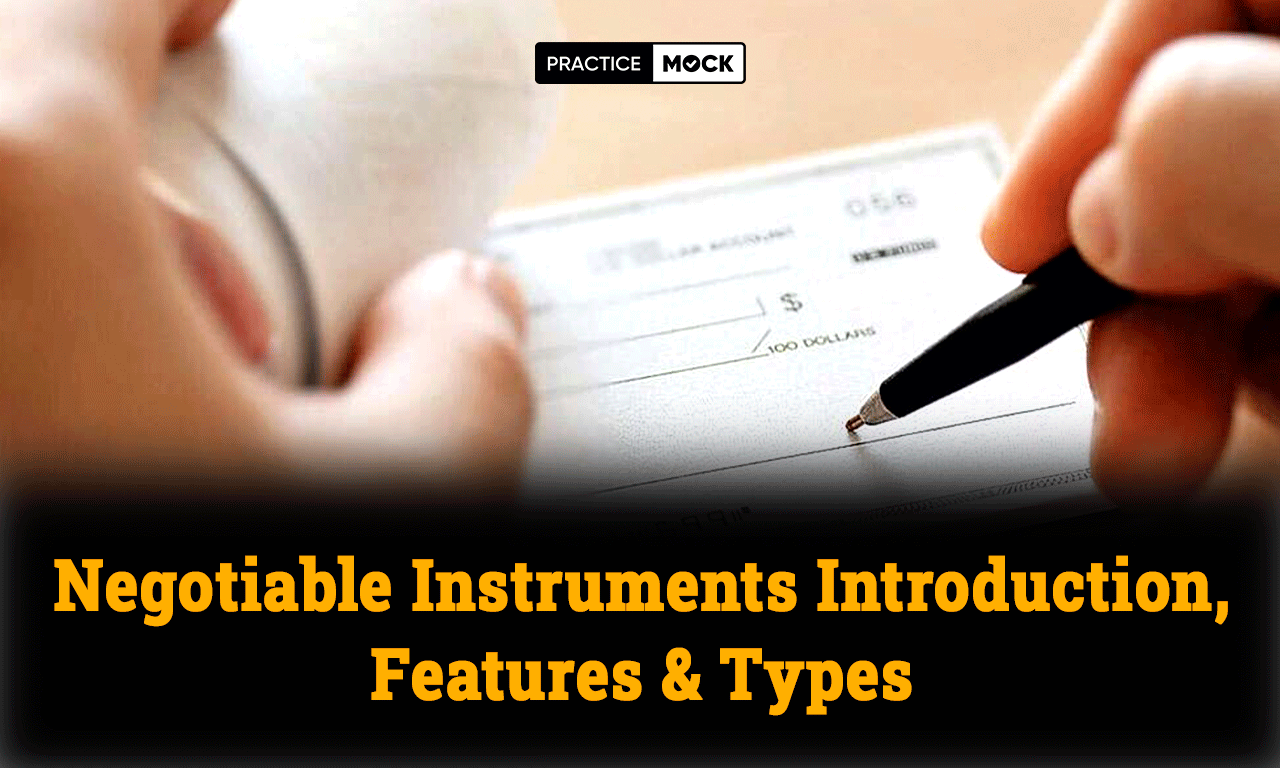Negotiable Instruments
Negotiable Instruments can be explained as these are written documents that can be transferred from one person to another and have a predetermined payment date. It includes bills of exchange, promissory notes, and cheques. These instruments can be transferred to different parties, giving the new holder full legal title.
“Negotiable” means anything that is easily transferable from one person to another in return for consideration whereas “Instrument” means, a written document by virtue of which a right is created in favor of some person.
Negotiable Instrument Act
- Definition: An Act to define and amend the law relating to Promissory Notes, Bills of Exchange, and Cheques.
- Act: Negotiable Instrument Act 1881.
- Commencement: Came into force on the first day of March 1882.
Types of Negotiable Instruments
Above we have provided a simple introduction to Negotiable Instruments. Here we have provided the details related to the different types of Negotiable Instruments.
- Promissory Note: An instrument in writing containing an unconditional undertaking signed by the maker, to pay a certain sum of money only to, or to the order of, a certain person, or to the bearer of the instrument.
- Bill of Exchange: An instrument in writing containing an unconditional order, signed by the maker, directing a certain person to pay a certain sum of money only to, or to the order of, a certain person or to the bearer of the instrument. It is an order made by one person to another to pay money to a third person.
- Cheque: A cheque is a written document that contains an order to the bank, to pay a certain sum of money to a specified person.
- Demand Draft: Similar to a cheque, but it is drawn by a bank, guaranteeing the payment to the payee.
- Bearer Instrument: A negotiable instrument payable to the person in possession of the document, without needing endorsement.
Functions of Negotiable Instruments
Negotiable Instruments have several necessary roles in the financial system to ensure that monetary exchanges are temporarily sealed securely. Key functions include:
- Medium of Exchange: They work as exchange for cash and facilitate the flow of money between two or more persons without actually using money.
- Credit Extension: Credit can be thus offered through utilization of negotiable instruments since they facilitate delayed payment. For example, a bill of exchange may be payable after some time in future.
- Transfer of Funds: These instruments allow for endorsements or delivery to one person, a business or between banks and it can be used in transferring funds easily.
- Proof of Payment: They act as legal required in the acknowledgement of payment fulfilment as a written confirmation of the financial deal between parties.
- Securing Payment: While realizing payment from the underlying note, negotiable instruments ensure payment to the holder and protection for dishonors especially when in the hands of a holder in due course.
Features of Negotiable Instruments
Some key features of negotiable instruments include:
- Transferability: They can be passed quickly from one individual to another by way of endorsement or delivery.
- Unconditional Promise: These instruments include a mere promise or an order to pay a stated amount of money unconditionally.
- Payment on Demand or Time: They may be redeemable at any time or at a future and definite date.
- Holder in Due Course: The owner who takes the instrument for value and without actual knowledge of any problem between the first parties receives the right to receive the money.
- Written Document: This instrument of payment is always in writing and must be signed by the maker or the drawer.
Banking Free Mock Test
Negotiable Instruments FAQs
Negotiable Instruments are written documents that can be transferred from one person to another and have a predetermined payment date.
Common examples negotiable instruments are promissory notes, bills of exchange, and cheques.
Yes, they can be transferred through endorsement or delivery.
An instrument in writing containing an unconditional undertaking signed by the maker, to pay a certain sum of money only to, or to the order of, a certain person, or to the bearer of the instrument.
- Sign Up on Practicemock for Updated Current Affairs, Free Topic Tests and Free Mini Mocks
- Sign Up Here to Download Free Study Material
Free Mock Tests for the Upcoming Exams
- IBPS PO Free Mock Test
- RBI Grade B Free Mock Test
- IBPS SO Free Mock Test
- NABARD Grade A Free Mock Test
- SSC CGL Free Mock Test
- IBPS Clerk Free Mock Test
- IBPS RRB PO Free Mock Test
- IBPS RRB Clerk Free Mock Test
- RRB NTPC Free Mock Test
- SSC MTS Free Mock Test
- SSC Strenographer Free Mock Test
- GATE Mechanical Free Mock Test
- GATE Civil Free Mock Test
- RRB ALP Free Mock Test
- SSC CPO Free Mock Test
- AFCAT Free Mock Test
- SEBI Grade A Free Mock Test
- IFSCA Grade A Free Mock Test
- RRB JE Free Mock Test
- Free Banking Live Test
- Free SSC Live Test



